Filter by...
Reset all
Publications (227)
Technical Note
pdf
This technical note describes the Uganda Revenue Authority (URA) presumptive tax returns data covering financial years from 2015/16 to 2022/23. The data contains 21 variables, including information on taxpayers’ characteristics, turnover, and payable taxes. It covers the population of small...

Rising public debt in Africa, exacerbated by multiple shocks and limited fiscal space, poses a significant challenge to the region’s development. Half of the low-income countries in sub-Saharan Africa (SSA) are in debt distress or at high risk of it, as calls for international action, such as...
Journal Article
This peer-reviewed research is available free of charge. UNU-WIDER believes that research is a global public good and supports Open Access.
COVID-19 pandemic, household welfare and diversification strategies of smallholder farmers in Uganda
Agricultural activities in many sub-Saharan African (SSA) countries are subject to various risk factors that the COVID-19 compounds. Earlier studies on the effect of COVID-19 on smallholders neglect the issue of comparison with non-farm households. The study uses micro-level household datasets to...
Report
pdf
This report documents UGAMOD, the SOUTHMOD model developed for Uganda. This work was carried out by Uganda Revenue Authority (URA) and Makerere University in collaboration with the project partners. The results presented in this report are derived using UGAMOD version 2.1, which is part of the...
Blog
Uganda, with a fiscal deficit of 5.6% in 2023, has increasingly turned to local resources to make up for its revenue shortfall since the World Bank suspended its funding on 8 August 2023 over the country’s anti-homosexuality law. In early April 2024, traders in downtown Kampala protested against...
Working Paper
pdf
– Comparing the performance of universal basic income in Uganda and Zambia during COVID-19
The debate over universal basic income (UBI) has gained traction in the developing world in recent years. We analyse the effects of four UBI schemes on poverty and inequality measures during normal times and times of crisis in Uganda and Zambia. We use static microsimulation models and nationally...
Working Paper
pdf
Cross-border traders face a choice between official and unofficial border crossings. The latter allow them to evade taxes, but expose them to other risks, such as bribes, fines, and arrest. We investigate the perceptions of cross-border traders about the risks of trading officially vs unofficially...
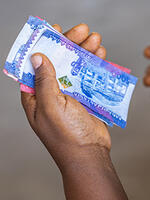
Sovereign Wealth Funds (SWFs) have become a symbol of national success and a means for global, commercial and geopolitical influence. But how well do they contribute to national development goals? Furthermore, global decarbonization threatens the future of many fossil fuel-financed SWFs. Here, we...

While multinational corporations (MNCs) make up only 1.9% of firms operating in Uganda, they are overrepresented among tax holiday beneficiaries. New estimates reveal that Uganda’s revenue losses due to these tax expenditures peaked at USD 42 million in 2020.A new dataset allows for the first...
Blog
Sub-Saharan Africa has abundant natural resources and a substantial market, with an estimated population of 1.2 billion. The population is projected to grow by nearly 80% and reach almost 2 billion people by 2043. This population growth is expected to parallel an economic expansion, with annual...

Donors increasingly speak of locally led aid response, but often do not walk the walk. Case in point is the United States Agency for International Development (USAID), the humanitarian and development agency of the largest donor country in the world. In late 2021, USAID set a target that 25% of its...
Journal Article
This peer-reviewed research is available free of charge. UNU-WIDER believes that research is a global public good and supports Open Access.
When seeking to increase their tax revenues, policy-makers face a likely tradeoff between decreasing personal income tax rates (making formalizing more attractive and potentially contributing to revenue) and alternatively raising tax rates (potentially slowing down the formalization of the economy...
Blog
As we conclude the groundbreaking years of the 2019–2023 work programme on transforming economies, states, and societies, we reflect on the milestones achieved and anticipate the journey ahead.In 2019, I assumed the role of Director at UNU-WIDER and initiated the planning of the new work programme...
Working Paper
pdf
This paper studies the impact of the COVID-19 pandemic on formal sector employment in Uganda. Utilizing employee-level administrative tax data from the Uganda Revenue Authority, we describe the dynamics of employment as the pandemic evolved, seeking to better understand the various coping strategies...
Technical Note
pdf
This Technical Note describes Ugandan trade data covering import and export declarations for ten calendar years from January 2013 to December 2022, constructed from transactional-level Ugandan administrative data. The trade data series contains transaction-level ten datasets on imports and ten on...
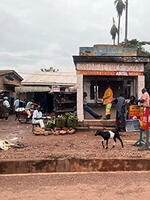
– Combining tax data and Google Street View images
The issue of tax non-compliance among businesses is pervasive in many developing economies, including Uganda. But to what extent do businesses comply with their tax obligations in the capital city, Kampala? Can the local environment and geographic information help predict the risk of tax non...

Parts of Uganda that had centralised political systems before colonial rule are more likely to have higher rates of voluntary tax compliance. Merima Ali and Odd-Helge Fjeldstad look at why that might be the case.Voluntary tax compliance is an important source for domestic revenue in Africa as the...
Working Paper
pdf
– Challenges and prospects for Uganda
This paper simulates the impact of the global minimum corporate tax rate (GMCTR) in Uganda by estimating the difference between the mechanical and the behavioural changes in tax revenue. Overall, implementation of GMCTR will increase tax revenue, and the revenue increase is inversely proportional to...
Working Paper
pdf
– Evidence from Kampala, Uganda
This paper investigates business tax compliance in a multilevel tax structure with limited coordination. We study the case of Kampala, where firms are taxed at national and local levels—by the Uganda Revenue Authority and the Kampala Capital City Authority, respectively—and where the agencies...
Working Paper
pdf
Uganda has one of the lowest corporate income tax collection rates in sub-Saharan Africa, while offering generous corporate tax incentives. It is unclear whether tax incentives achieve their objectives without primarily benefiting firms, potentially undermining domestic revenue mobilization and...

The annual WIDER Development Conference held this year in Oslo concentrated on domestic revenue mobilization (DRM). The 2.5-day hybrid event emphasized both the progress made and unresolved problems in increasing economic autonomy and improving development prospects in the Global South.The...
Technical Note
pdf
This technical note describes the Uganda Revenue Authority (URA) Pay-As-You-Earn (PAYE) data covering financial years 2013/14 to 2021/22. PAYE is paid by an employer who withholds personal income tax on employees’ wages and other employment incomes like benefits and allowances. The data are...
Blog
Data is the key to informed decision-making in today's rapidly changing world. As nations strive to address complex economic challenges, data-driven insights have become indispensable. South Africa is no exception, facing issues like declining GDP per capita, sluggish productivity growth, and rising...

– How collaboration can help
UNU-WIDER has worked for several years in collaboration with sub-Saharan African revenue authorities to facilitate the analysis of digital tax data. During a visit to Kampala, Uganda this year, we asked our colleagues how this collaboration has been useful to them. How do they see their role going...

With the deadline for achieving the UN’s Sustainable Development Goals just seven years away, there is an increasing sense of urgency over the question of how to finance the ambitious framework, particularly in lower- and middle-income countries.Experts met at the recent WIDER Development Conference...
Blog
In celebration of South Africa's Women's Month, SA-TIED is spotlighting women driving change in economics. Through the 'Breaking Barriers, Building Economies: Women in Economic Policy' campaign, we highlight their achievements, challenges, and invaluable contributions. Pumla Bam, Senior Specialist...

There has been a revival of interest in the state’s role in economic development. Recent research argues that the most successful economies are those where effective states provide crucial public goods and services. The historical emergence of effective tax systems and the related processes by which...
Working Paper
pdf
– Evidence from Uganda
We investigate how the arrival and expansion of mobile network access in Uganda influences firm tax behaviour. Access to mobile technologies could broaden government revenues from corporate income tax through the extensive margin: by reducing the costs of formalization, it could increase the number...
Journal Article
This peer-reviewed research is available free of charge. UNU-WIDER believes that research is a global public good and supports Open Access.
Part of Journal Special Issue
Fiscal state capacity
Working Paper
pdf
– Evidence from personal income tax reform in Uganda
We evaluate a major personal income tax reform in Uganda that came into effect in 2012–13, contributing to the scarce literature on the effects of personal income tax reform on employees’ income in a low-income country in Africa. The reform increased the tax-free lower threshold, increased tax rates...

Across Kenya, Malawi, and Zambia, political candidates often attempt to buy the votes of the most socio-economically deprived communities. But new research from Prisca Jöst and Ellen Lust argues that social cohesion in these communities is instrumental in determining the levels of support for...

In Mozambique, Tanzania, South Africa, Uganda, and elsewhere, UNU-WIDER is on the ground to support national development plans, collect and create data for economic analysis and national and international policy processes, and build the capacity of government officials to develop national economies...
Report
pdf
This report documents UGAMOD, the SOUTHMOD model developed for Uganda. It describes the different tax–benefit policies in place, how the microsimulation model picks up these different provisions, and the database on which the model runs. It concludes with a validation of UGAMOD results against...

– A game changer for efficient and fair taxation
In May 2022, the Uganda Revenue Authority (URA) and UNU-WIDER collaboratively launched a secure research data laboratory facility in Kampala, Uganda. The research lab is the second of its kind on the African continent in providing secure access to the revenue authority’s administrative tax data. The...
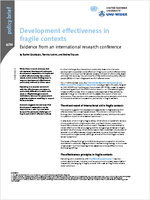
– Evidence from an international research conference
This policy brief draws on the studies presented at the International Research Conference on the Effectiveness of Development Cooperation on 17–18 November 2022, in Brussels, Belgium, jointly organized by UNU-WIDER and the European Commission (DG INTPA) under its capacity as the leading entity of...
Working Paper
pdf
We study the effectiveness of social protection benefits in reducing income and consumption poverty in five sub-Saharan African countries—Ghana, Mozambique, Tanzania, Uganda, and Zambia—in normal times and times of widespread economic crisis. Using tax–benefit microsimulation models with...
Working Paper
pdf
Uganda’s post-colony continues to be haunted by the colonial logic of ethnicity. This logic has mapped the country’s post-colonial political landscape as a terrain on which spirals of ethnic-based conflicts and violence are the norm. Because colonial ethnic spatial demarcations were also unequally...
Working Paper
pdf
– Evidence from household panel data in Uganda
Empirical studies on the effectiveness of aid to the water, sanitation, and hygiene sector (WASH aid) have focused primarily on access to these services as the benchmark for evaluating the effectiveness of aid in this sector. Given the importance of WASH services for public health outcomes, the...
Working Paper
pdf
Agricultural activities in many African countries are bedevilled by a range of risk factors. Using micro-level household datasets from a range of countries in Africa, we examine the drivers of agricultural risks, while exploring the role of context as well as the impact of the COVID-19 pandemic on...

Across sub-Saharan African (SSA) countries there are striking differences in citizen willingness to pay taxes. For example, in Mali, Senegal, and Ghana, around half of those surveyed ‘strongly agreed’ that the government has the right to make people pay taxes, but in Cote d'Ivoire this figure is...

Modern states are complex organizations which perform a broad range of functions. They have an important role in economic and human development. The consensus from recent research suggests that effective states provide crucial public goods and services, such as universal education, public health...
Blog
In this blog, the managing editor of the WIDERAngle shares his personal view on some of the most important —and potentially overlooked— work recently released in the WIDER Working Paper Series. We just passed the halfway point of 2022 and, as of this writing, UNU-WIDER has already released 70...

‘I intend to see a world in which tax policy research is based on evidence, and policy decisions are data-driven.’ This is an aspiration expressed by a participant of the WIDER Winter School 2022. The comment summarizes well the reasoning behind the course and UNU-WIDER’s goals for domestic revenue...
Report
pdf
View the latest UGAMOD country report here. This report documents UGAMOD, the SOUTHMOD model developed for Uganda. It describes the different tax–benefit policies in place, how the microsimulation model picks up these different provisions, and the database on which the model runs. It concludes with...

Just over seven months ago the United Nations convened its 26th Climate Change Conference (COP-26) in Glasgow, with the world nervously emerging from the pandemic. Even before that, energy prices were already ticking up — a trend that accelerated when Russia invaded Ukraine. The global response to...

The first of the Sustainable Development Goals (SDGs) is to end poverty in all its forms, everywhere. The monumental task — a long-time dream of humanity — is followed by 16 more goals under the 2030 Agenda. Though they are all interlinked, to even contemplate their achievement requires a deep well...
Technical Note
pdf
This technical note describes the Uganda Revenue Authority (URA) firm panel, which is constructed from administrative corporate income tax (CIT) returns and firm registration data for the financial years 2013/14–2019/20. The panel dataset contains over 300 variables, which allow the user to study...

– And how to deal with them
Children from poorer families in Kenya, Tanzania, and Uganda face a double disadvantage in their opportunity to access learning: not only is the overall quality of education low in these countries, but they also attend relatively poorer-quality schools. This column reports new evidence on how...

Millions of Africans lost their jobs as a result of the coronavirus pandemic, but state social security systems were of little help to people who lost their income.This is the conclusion of a study conducted by the United Nations University World Institute for Development Economics Research, UNU...
Working Paper
pdf
We use income data from tax registers at the Uganda Revenue Authority from 2011 to 2017 to estimate top income inequality, focusing on the very top—the top 1, 0.1, and 0.01 per cent of the income distribution. The focus on the extreme top is facilitated by access to population data on formal sector...

The COVID-19 pandemic has shown that African tax and social-benefit systems are currently ill-equipped to protect households from sudden income losses. Meaningful progress will require policymakers to reduce the size of the informal sector and improve the design and financing of social-protection...

– How five African countries fared
The number of people living in poverty around the world is estimated to have increased by half a billion people due to the COVID-19 crisis. The African continent has suffered at least US$100 billion in economic costs in 2020, measured by the reduction in trade revenues and financial flows due to the...

Are there enough tax payers to generate the revenue needed by governments to reduce poverty? How adequate are the social security arrangements that already exist? Anyone who has started to probe these issues will know that the answers to such questions can be hard to pin down. This is why the...
Journal Article
This peer-reviewed research is available free of charge. UNU-WIDER believes that research is a global public good and supports Open Access.
– Dead end or stepping-stone?
Despite rapid economic growth in recent decades, informality remains a persistent phenomenon in the labor markets of many low- and middle-income countries. A key issue in this regard concerns the extent to which informality itself is a persistent state. Using panel data from Ghana, South Africa...
Working Paper
pdf
The paper examines the legacy of pre-colonial centralization on tax compliance norms of citizens in contemporary Uganda. By combining geo-referenced anthropological data on pre-colonial ethnic homelands with survey data from several rounds of the Afrobarometer Survey, respondents from the...
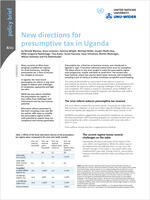
Presumptive tax, a final tax on business income, was introduced in Uganda in 1997. It has been reformed several times since its conception. The latest reform in July 2020 sought to make the presumptive regime more progressive, simpler and fairer to small firms. The revised rates have however raised...
Blog
How do crises such as the COVID-19 pandemic influence inequality and the other way around? This year’s UN Day Dresden put a spotlight on “Inequalities in Crises”. In an interview, we got up close and personal with our keynote speaker Dr Pia Rattenhuber (UNU-WIDER), an expert in development economics...
Working Paper
pdf
– A microsimulation analysis on selected African countries
Although the effect of fiscal drag is well studied in the industrialized world, empirical evidence from developing economies remains limited. Against this backdrop, this study aims to explore the effect of fiscal drag on income distribution and work incentives. To this end, the study employs...
Working Paper
pdf
– Evaluating the 2020 reform and four alternative reform scenarios using UGAMOD, a tax-benefit microsimulation model for Uganda
Presumptive tax, a final tax on business income, was introduced in Uganda in 1997. The latest reform to the regime in July 2020 sought to make the system more progressive, simpler, and fairer to small firms. In this work, we evaluate the reform, focusing on its revenue implications based on...

The situation of Afghanistan has drawn a picture of a poor, conflict-prone, doomed country. But this does not have to be the case. We have examples of several countries able to rise out of poverty, despite conflicts, climate challenges, or large population. International co-operation for eradicating...

Tanzania, similar to most sub-Saharan countries, reported its first COVID-19 cases in March 2020. While GDP estimates suggest that the economy was less hard hit than in other African countries, some sectors have nevertheless experienced negative growth. Even with contained GDP contractions in 2020...
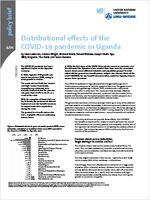
In 2020, the first wave of the COVID-19 pandemic caused an economic crisis that disrupted the Ugandan labour market. How large were the associated income losses across different industries and population groups? To what extent did the general tax-benefit system mitigate the adverse effects of the...

In summer 2020 the SOUTHMOD team set out, with partners, to analyse the impact of government policies on protecting households from getting poorer and avoiding societies from becoming more unequal. Now we are releasing a cross-country comparative study that analyses the distributional effects of the...
Working Paper
pdf
This paper analyses the distributional effects of the COVID-19 pandemic and related tax-benefit measures in 2020 in a cross-country comparative perspective for five African countries: Ghana, Mozambique, Tanzania, Uganda, and Zambia. We first estimate the impact of the crisis on disposable incomes...
Technical Note
pdf
This note sets out two different methods on how to adjust incomes in the microdata underlying the standard SOUTHMOD models to reflect a sudden shock, in this case the COVID-19 shock, as done in the accompanying working paper by Lastunen et al. (2021). The note first describes how industry-specific...

Tanzania is, together with Kenya and Uganda, one of the founding members states of the East African Community (EAC), a regional intergovernmental organization which nowadays consists of six partner states in the region. Since the revival of the new EAC in 2000, EAC Customs Union (EAC-CU) in 2005...

– Research recommendations to improve policies
How can we determine the taxation of wage earners or multinational corporations in a fair manner? Will simplifying tax administration help increase tax compliance in a low-income country context? In this blog, we highlight several policy recommendations arising from our collaborative research...

During the first year of the pandemic, it was wealthier countries, with their comparatively stronger health systems, civil services, legal systems and other public services, that suffered the highest rates of COVID-19. Indeed, countries rated to be best prepared to respond to public health threats...
Background Note
pdf
– The South African experience
Introduction: data for development Globally, one of the key factors associated with increasing use of data to inform policy-making has been the increased availability of new administrative data sources. In 2014, the National Treasury of South Africa (NT) pioneered the development of new tax...

Informality is a pervasive phenomenon in the labour markets of developing countries. Two billion workers, representing 61.2 per cent of the world’s employed population, are in informal employment. Emerging and developing countries account for more than 93 per cent of total global informal employment...

– Does it make a difference?
How could countries in the Global South develop their tax systems further and improve compliance? This analysis shows how two tax administration interventions impacted the number of small business taxpayers and presumptive tax revenues in Uganda. One-stop-shops — where citizens could register for...
Working Paper
pdf
– Do multinational corporations face lower effective tax rates and is there evidence for profit shifting?
We study how large domestic firms and multinational corporations compare in their effective tax rates and whether there is evidence of profit shifting out of Uganda. Using administrative data from the Uganda Revenue Authority and regression analysis, we find that multinational corporations lower...
Technical Note
pdf
– The case of UGAMOD
This note describes how to incorporate sub-national poverty lines into a SOUTHMOD country model using conditional constants within the constants function in such a way that the Statistics Presenter can generate national-level poverty statistics. The Uganda tax-benefit microsimulation model UGAMOD is...

On 17 February 2021 the Groningen Growth and Development Centre (GGDC) and UNU-WIDER Economic Transformation Database (ETD) will be launched. The new database provides crucial information on changes in the economic structure of economies across Africa, Asia, and Latin America. Preliminary findings...
Working Paper
pdf
– Evidence from Ugandan administrative tax data
This paper conducts an impact evaluation of the effects of two tax administration interventions—a taxpayer register expansion and education programme, and a new electronic filing system for presumptive tax—on the number of small business taxpayers and presumptive tax revenues in Uganda. Using a...
Working Paper
pdf
We evaluate a major personal income tax reform in Uganda that came into effect in 2012–13. The reform increased the tax-free lower threshold, increased tax rates for higher incomes, and introduced an additional highest tax band. Using the universe of pay-as-you-earn administrative data submitted by...

– The role of tax and benefit policies in alleviating poverty and inequality
As the crisis caused by the COVID-19 pandemic evolves, developing nations are struggling to deliver economic assistance and public services to their citizens, under pressures of fiscal constraints and tax revenue losses. To help governments in the developing world navigate through the crisis, it is...
Working Paper
pdf
– Revenue generation, investor-stakeholder alignment, and public policy
This paper discusses the political economy of oil in Uganda since the announcement of its discovery in 2006. It focuses on the dynamics of oil revenue generation (pre-commercial production) and expenditure, investor-stakeholder contestation (i.e. between bureaucrats, investors/oil companies, and...

– How can natural resources support inclusive growth in Africa
For a growing number of countries in Africa the discovery of natural resources is a great opportunity, but one accompanied by considerable risks. There is an extensive literature linking natural resource dependence to poor economic performance. One cause is that resource-abundant economies tend to...
Displaying 80 of 227 results
 Join the network
Join the network